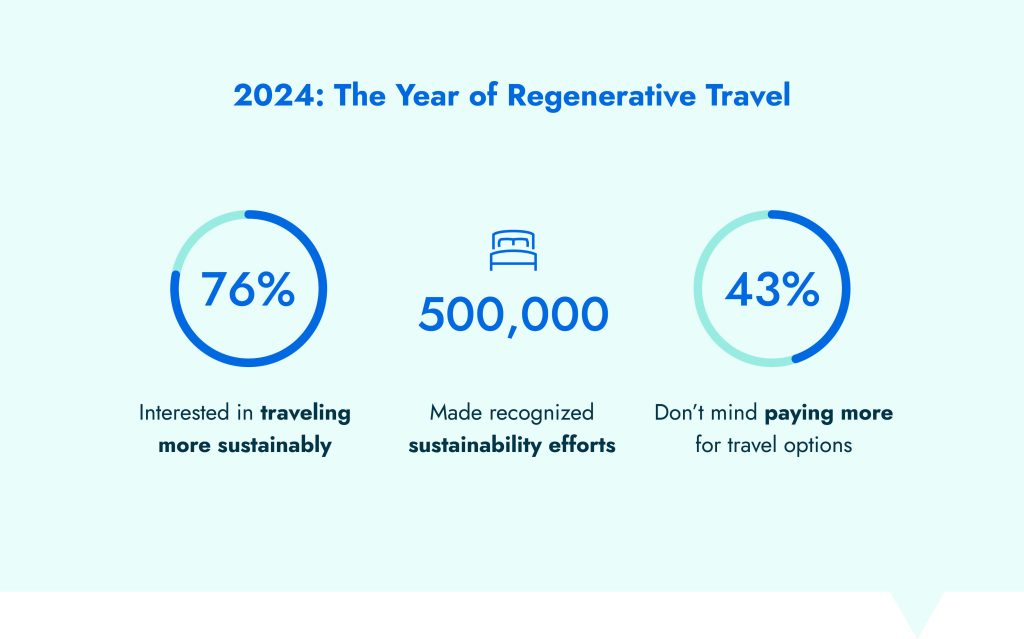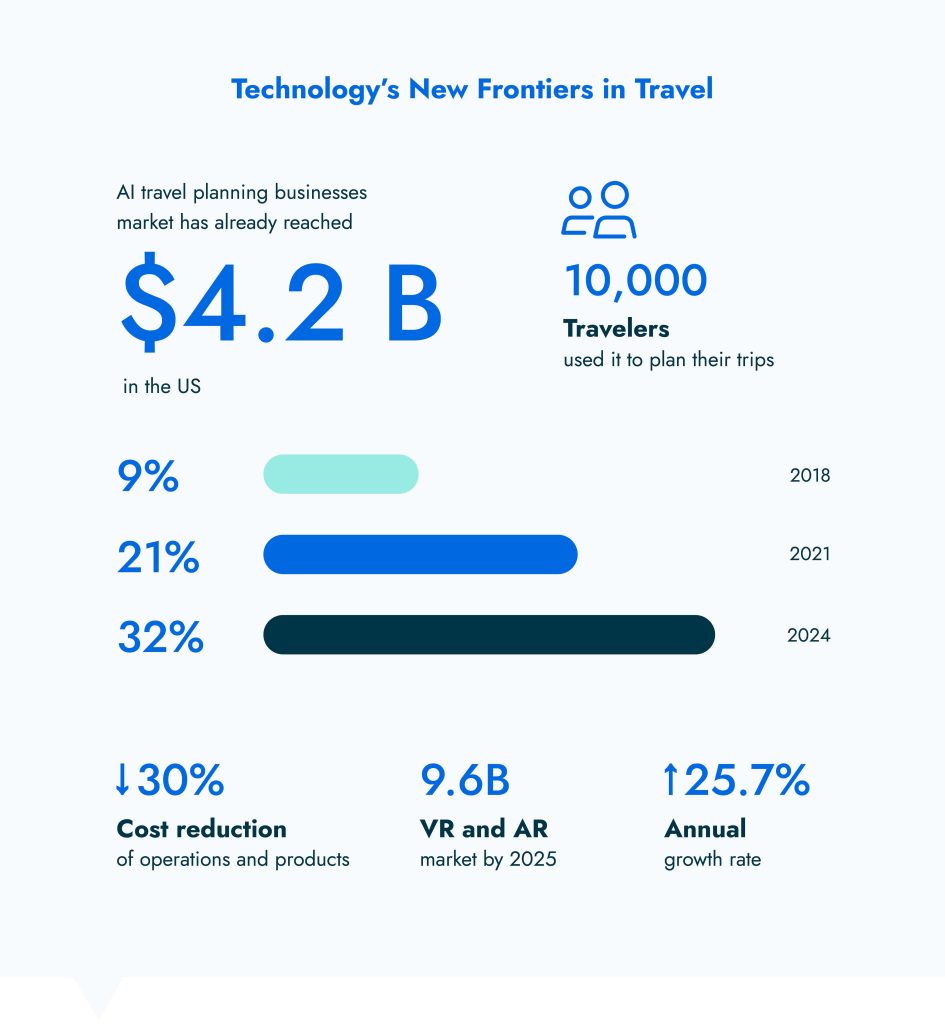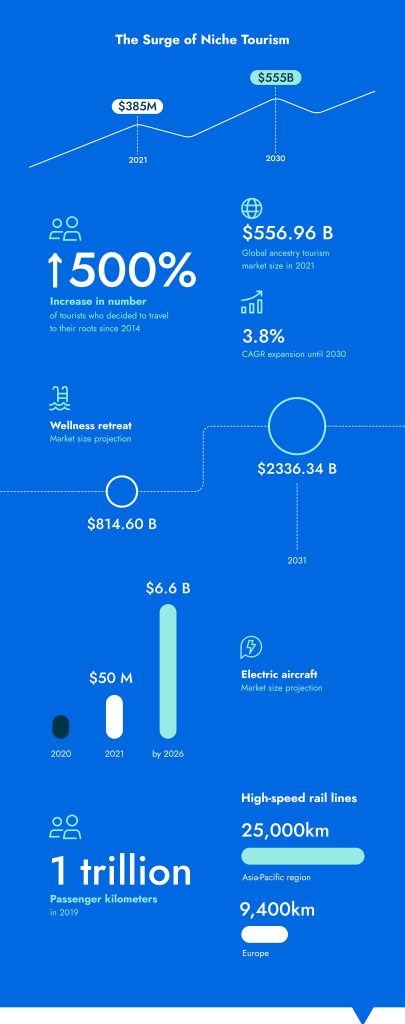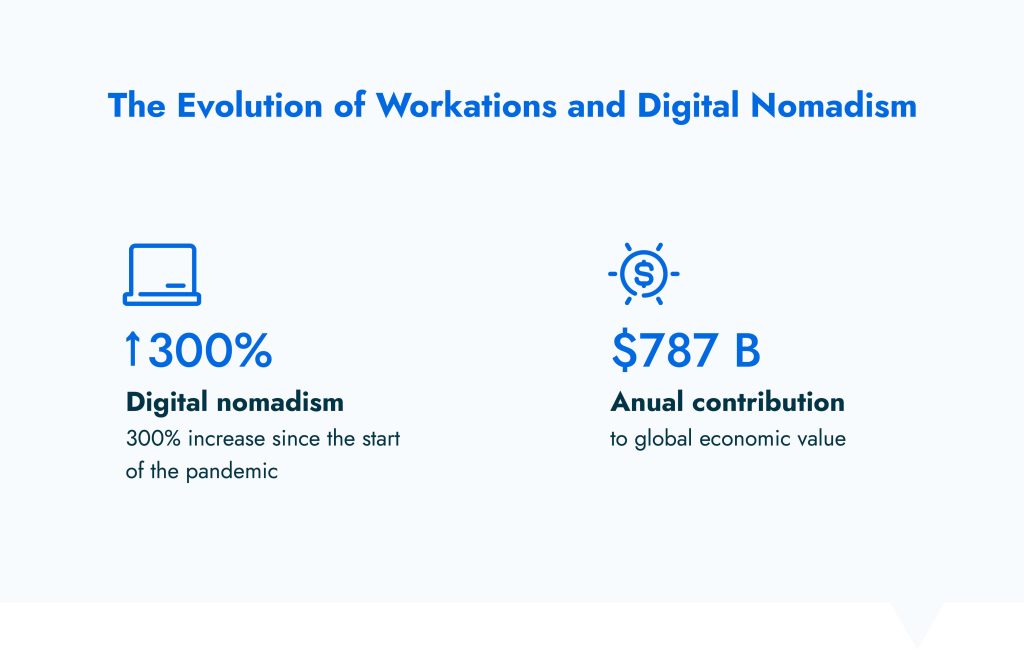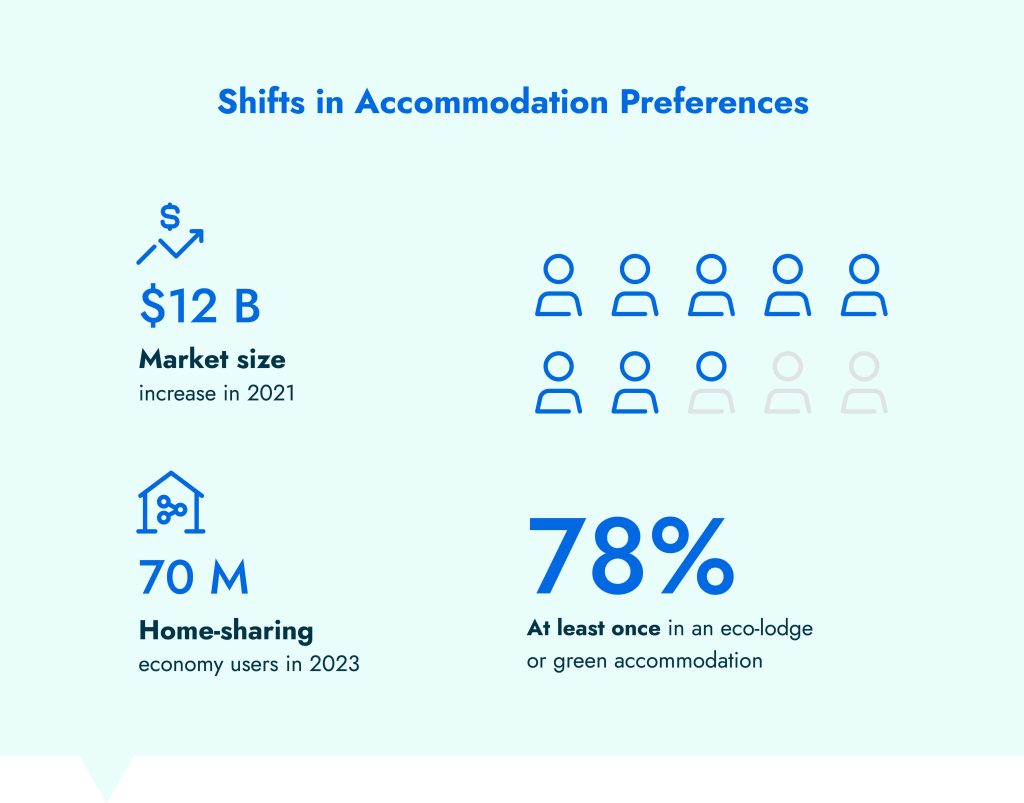Unveiling the 13 Hottest Travel Trends of 2024

No one knows better than you how dynamic the realm of travel is. Dynamic shifts brought by technological strides, ever-changing traveler priorities, and global events are the new normal in 2024.
How do you navigate this landscape that keeps transforming?
You should familiarize yourself with the very travel trends that shape the world of travel. Below, you can find everything you need to map this evolving landscape to successfully navigate it, better align your business goals, and make informed decisions.
2024: The Year of Regenerative Travel
When it comes to the paradigm shifts in the travel industry, the year 2024 was huge. Today, at the center of the stage, we have regenerative travel, which makes the bond between exploration and preservation firmer than ever before.
We are not talking exclusively about the sustainable practices here. Regenerative travel now includes the preservation of cultural heritage and the restoration of ecosystems.
There are two sides to every story. The case is the same here. On one side, we have destinations; on the other, we have travel businesses. Destinations are continuously working on redefining their appeal. They embrace regenerative principles to take an active role in contributing to ecological restoration.
The same applies to accommodations. With waste reduction initiatives, energy-efficient systems, and sustainable architecture, accommodations also showcase their devotion to meeting regenerative travel standards.
Travel businesses are crucial in helping this trend emerge and become a new paradigm. The priority is on regenerative practices, which reflect travel products and packages. Sourcing products tailored to meet the new regenerative travel standards is imperative.
Finally, communities at destinations are starting to not only celebrate but protect their unique heritages. It’s the final piece that completes the regenerative puzzle to create immersive experiences.
But why is regenerative travel the new travel paradigm in 2024? Why are destinations, accommodations, travel businesses, and communities at destinations doing it all?
Because regenerative travel is a two-way street, and on the other side of it, we have tourists. According to the Sustainable Travel Report 2023, a whopping 76% of travelers are interested in traveling more sustainably. The same report finds out that over 500,000 accommodations worldwide made recognized sustainability efforts.
Interestingly, 43% of travelers don’t mind paying more for travel options if they carry sustainable certification.
Technology’s New Frontiers in Travel
Technological innovations are one of those factors that are always primed to bring new changes to verticals. Such is the case with the travel sector, too. The most noteworthy technological innovations poised to reshape travel in 2024 include AI-driven personalized itineraries, blockchain for secure and transparent bookings, and the rise of virtual “try-before-you-buy” travel experiences.
AI-driven personalized itineraries
Travel businesses already use tech-based AI. One of the newer frontiers in travel is made possible thanks to AI algorithms that can curate personalized travel itineraries. These solutions can tailor-make itineraries that cater to particular needs and interests. To do it, they gather and analyze travelers’ preferences and relevant data. The AI travel planning businesses market has already reached $4.2 billion in the US.
This is a brand-new tech. While the adoption rates are not over the roof, some early adopters have had incredible results. Take Goodspeed, for instance. The company decided to leverage AI to tackle the drawbacks of holiday planning.
Thanks to AI, it’s no longer overwhelming, time-consuming, and stressful. In just one week, over 10,000 travelers used it to plan their trips. Booking.com also jumped the train with its AI Trip Planner.
According to Statista, the share of AI-influenced revenue in the travel industry is steadily rising. It was at 9% back in 2018, 21% in 2021, and it’s projected to reach 32% in 2024. The investors are interested in this niche. Take TravelPerk’s $104 million fundraising led by SoftBank. The company is planning to invest heavily in AI-based tech to enable further growth and product expansion.
Blockchain for secure and transparent bookings
Blockchain brings two new things that travelers with security concerns will greatly appreciate. Decentralized ledgers and smart contracts provide tamper-proof records. With blockchain, fraud becomes impossible, and bookings become completely transparent, thus paving the way for a secure and accountable future of bookings.
One of the best examples in this niche is LockTrip. This booking engine leverages blockchain tech to bring transparency to the booking process. Data like prices, property details, and reviews are kept on an immutable ledger. It simply means that nobody can change or manipulate data for any gain.
As the paper finds out, while blockchain can help OTAs reduce the costs of operations and products by up to 30%, it’s still not widely adopted.
Virtual “try-before-you-buy” travel experiences
Lifelike simulations are no longer reserved for attention-grabbing SciFi movie trailers. Thanks to VR tech, travelers can now benefit from interactive experiences without leaving their homes. They can take a sneak peek at many destinations from the comfort of their homes. People can now make informed purchase decisions as VR helps enhance their confidence and reduce uncertainties.
The adoption rates of VR and AR solutions in the travel sector are high. The VR and AR market in the tourism industry is a testament to this, and it is projected to reach $9.6 billion by 2025. That’s an annual growth rate of 25.7%. Some early adopters include Thomas Cook Airlines, Visit Wales, and Marriott.
The Surge of Niche Tourism
If anything, 2024 is the year many niche tourism sectors soared, including space tourism, ancestry tourism, and wellness retreats.
Space tourism
Space tourism is a narrow niche featuring products that cater to the needs of tech enthusiasts and adventure seekers. Anyone interested in experiencing the cosmos firsthand will be interested in space tourism. In 2021, the space tourism market generated $385 million. However, this figure is bound to reach $555 billion by 2030.
Ancestry tourism
Some of the travelers are history buffs. There are also those interested in discovering their roots and reconnecting with them. This particular demand gave birth to the ancestry tourism niche. The unique products and services it provides are tailored to individual needs, but they all revolve around unlocking the powerful stories covered by the ancestral dust in faraway lands.
Many stats support the soaring nature of the ancestry tourism niche. In 2018, Aiurbnb did a study to reveal that the number of tourists who decided to travel to their roots had increased by 500% since 2014. The global ancestry tourism market size has reached $556.96 billion in 2021, and it’s projected to expand at a CAGR of 3.8% until 2030.
Wellness retreats focusing on mental health
Rejuvenation and self-care-themed travel packages are becoming more attractive with every passing year. At the same time, depressive symptoms grew by 28%, and anxiety disorders grew by 25%. A study reveals that Gen Z and Millennials are stressed most of the time, so it’s common sense to see them interested in wellness retreats.
The latest industry report has a wellness retreat market size valued at $814.60 billion and projected to reach $2336.34 billion by 2031.
Sustainable Mobility and Transportation Trends
Our journey through the hottest travel trends of 2024 brings us to sustainable mobility and transportation trends. Here, on the map, we have electric aircraft, high-speed rail networks, and green cruising. Let’s analyze the shift towards these sustainable transportation options.
Electric aircrafts
When it comes to air travel, electric aircraft are bound to bring a major shift towards a green future. We are talking about a sustainable transportation trend with zero to minimal environmental impact. Electric aircraft can contribute to reducing greenhouse gasses and air pollution in general because they produce zero emissions during flight.
In 2021, the electric aircraft market size barely reached $50 million. However, this is a 100% increase compared to 2020. This market is projected to reach $6.6 billion by 2026.
High-speed rail networks
High-speed rail networks stand as a green alternative to traditional rail networks. It’s also an energy-efficient alternative with significantly lower emissions per passenger than any other conventional transportation.
This eco-friendly travel method reached the milestone of 1 trillion passenger kilometers in 2019. The adoption rates will continue to remain as high. For instance, the Asia-Pacific region will build 25,000 kilometers of high-speed rail lines in the foreseeable future, and Europe will follow with 9,400 kilometers.
Green cruising
If we move from the land and look at the seas on the oceans, it’s clear that eco-friendly trends are also shaping the future there. The maritime industry offers green cruising to businesses in the travel vertical.
Green cruising features emission reduction systems and uses cleaner fuels, enabling it to minimize the environmental impact of cruise ships. Knowing that a large cruise ship’s carbon footprint is greater than 12,000 cars, this change is great news.
While all the major factors in the cruise travel sector have joined the efforts to make the future of sustainable cruise travel possible, it will take some time before we see high adoption rates.
The Evolution of Workations and Digital Nomadism
Did you know that the community of digital nomads keeps growing? In fact, since the start of the pandemic, their number has increased by 300%. The travel industry had to accommodate this change. However, this change did not only impact the travel sector but also governments.
Why? All of a sudden, there was a need to issue digital nomad visas. It’s a win/win situation, given that attracting remote workers provides both cultural and economic benefits. The latest report outlines that digital nomads contribute a global economic value of $787 billion annually.
When it comes to changes in the accommodation offerings, they revolve around adding destinations that can be ideal basecamps, securing high-speed WiFi access, fixed-rate stay options, or even reduced rates for long-term guests.
Shifts in Accommodation Preferences
Traveler preferences for accommodations are not carved out in stone. They keep changing. The main factors are contextual. Let’s examine the three major shifts in accommodation preferences and see what factors may be driving them.
Boutique hotels
Boutique hotels are typically smaller in size and with unique designs. They offer stylish accommodations and personalized service. The market size continues to increase. In 2021, it reached $12 billion. These hotels often outperform their traditional counterparts in ADR and occupancy rates.
Boutique hotels stand out from the crowd because they are unique, offer personalized service, add more value, and aim to provide an experience beyond just a place to sleep. It perfectly aligns with new travelers’ needs – they want personalized service and memorable and unique experiences.
Eco-lodges
Eco-lodges are accommodation solutions designed and developed from the ground up to have the minimum possible environmental impact. They incorporate all the latest green technologies, solutions, and materials to pull it off.
People are becoming more aware of the long-term problems caused by carbon emissions. Around 78% of travelers reported they plan to stay at least once in an eco-lodge or green accommodation during the following year.
Home-sharing platforms
Finally, we have one last alternative to traditional hotel accommodation enabled by home-sharing platforms. The number of home-sharing economy users reached almost 70 million in 2023. Why is this form of travel gaining in popularity?
There are many reasons why travelers see home-sharing platforms attractive. The research finds the following four as the most important: a good option for families or others who travel as a group, a good way for homeowners to earn extra income, less expensive than a hotel, and best for adventurous travelers.
Conclusion
Whether you want to admit it or not, the new wave of travelers is here, and we are riding it. That’s precisely why we have so many transformative trends in 2024 that make the travel sector even more dynamic than it is.
The major trends include technology-enabled ones such as AI and blockchain, the surge of niche tourism, sustainable mobility and transport, the surge of eco-lodges, and digital nomads.
While you may see all of these trends as challenges, some may see them as opportunities for businesses to innovate and cater to the new wave of travelers. This is your chance to identify your new target travelers and do everything you can to cater to their needs, expand your brand, and become an authority in your niche.
FAQ Section
Traveler destination choices are subject to significant geopolitical events. These events in 2024 have the travelers’ focus shift toward the lesser-known regions and secondary cities. What drives this trend are safety concerns and a desire for authenticity. With traditional hotspots out of the picture, there is room for new, unique experiences.
Economic factors were always the most important ones when it came to travel budgets. Given that more and more travelers are becoming budget-conscious and global inflation is going up, it’s logical to see travelers prioritize affordability without compromising quality. Leveraging AI planners and all-inclusive options have become more pragmatic.
The airlines are adopting innovations to adapt to the changing travel trends in 2024. Major players started using sustainable aviation fuels to reduce their carbon footprint. They are also turning to digital experiences to offer more personalized services. Finally, with electric aircraft on the horizon, the future of airlines looks greener than ever.
The potential challenges include workforce upskilling and the need for swift technological integration. It may prove hard to ensure sustainable practices and properly address geopolitical uncertainties. However, these potential hurdles can be turned into opportunities for growth and innovation.
Embracing sustainability can help achieve long-term travel industry resilience. New technologies can improve guest experience and enhance operational efficiencies, and finally, collaboration between sectors within the travel vertical can foster holistic solutions.
Subscribe to
our newsletter
Yay! You are now
subscribed to our
newsletter
Mize is the leading hotel booking optimization solution in the world. With over 170 partners using our fintech products, Mize creates new extra profit for the hotel booking industry using its fully automated proprietary technology and has generated hundreds of millions of dollars in revenue across its suite of products for its partners. Mize was founded in 2016 with its headquarters in Tel Aviv and offices worldwide.
Related Posts

30 Most Important Travel Industry Events for 2024
30 min. Many travel industry experts believe that travel industry events play a pivotal role in shaping the future of the travel industry. Why is this so? It’s because these events foster collaboration, networking, and innovation among key stakeholders in this vertical. As a platform for sharing best practices, trends, and insights, travel industry events […]

Empowering Equality: Mize Leads the Way in Travel Technology
7 min. Are we all equal? Are we all equally represented in the business world? In some professional sectors, there might still be some under-representation of women, minorities, and the LGBTQIA+ community. The tech sphere is no different, but is the travel tech sector a spark of hope? As the business world becomes more diverse, […]

Slow Tourism Case Studies: Examples to Truly Understand Slow Tourism
14 min. The tourism industry is moving at an ever-accelerating pace. That’s because the tourism industry is perhaps one of the verticals that depend on the most factors. One of the main factors that affect it is social movements, given that tourism brands of all sizes always cater to the needs of consumers. One of […]
